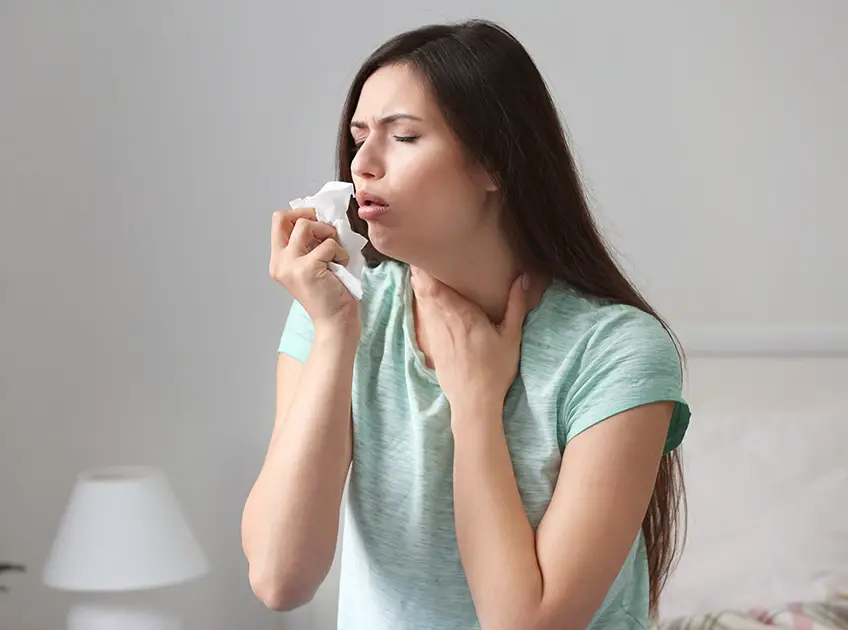
Important: This article is for informational purposes only. Please read our full disclaimer for more details.
A cough is a common ailment that can be caused by a variety of things, including the common cold, sinus infections, bronchitis, and even allergies. While there are many over-the-counter and prescription medications available to treat coughs, some people prefer to try home remedies first.
Can Home Remedies Treat Cough?
There is no one-size-fits-all answer to this question, as the effectiveness of home remedies can vary from person to person. Some home remedies may work well for some people, while others may find them to be ineffective. It is always best to speak with a doctor before trying any new treatment, especially if you have a chronic condition or are taking any medications.
That said, there are a few home remedies that are thought to be effective for treating coughs. That include these 10:
1. Honey
Honey is a popular home remedy for coughs and sore throats. It is thought to work by coating the throat and soothing irritation. Additionally, honey has antimicrobial properties that can help fight infection.
[ Recommended: Honey for Cough ]
2. Ginger
Ginger is another popular home remedy for coughs and sore throats. It is thought to work by reducing inflammation and relieving swelling and pain. Additionally, ginger may help reduce nausea and vomiting.
3. Throat lozenges
Throat lozenges are a convenient way to soothe a sore throat. They work by lubricating the throat and providing relief from pain. Many throat lozenges also contain ingredients that can help reduce inflammation and fight infection. Take lozenges containing vitamin c, zinc or echinacea to get better results.
4. Salt water Gargle
Gargling with salt water is a popular home remedy for sore throats. It is thought to work by reducing swelling and helping to flush out irritants. Additionally, salt water may help to thin mucus, making it easier to cough up.
5. Peppermint Tea
Peppermint tea is a soothing beverage that can also help relieve a cough. Peppermint is thought to work by reducing inflammation and relieving pain. Additionally, peppermint tea may help to thin mucus and make it easier to cough up.
For steam treatment, Add a few drops (6-7) of peppermint essential oil to hot water bowl and cover yourself with a blanket and inhale the steam for a quick relief
6. Drinking More Water:
Drinking plenty of fluids is important when you have a cold or the flu. It helps to thin mucus, prevents dehydration, and flushes out toxins. Water is the best fluid to drink, but you can also drink juices, soups, and herbal teas. Avoid caffeine and alcohol, as they can dehydrate you.
7. Use a Humidifier:
Dry air can irritate your throat and make your cough worse. Using a humidifier can help to add moisture to the air and reduce irritation. The cold mist humidifier helps reduce congestion and ease cough. Be sure to clean your humidifier regularly to prevent the growth of mold and bacteria.
8. Hot Drinks & Soups:
Hot drinks and soups can help to ease coughing. They work by lubricating the throat and providing relief from pain. Additionally, hot beverages can help ease chills, sore throat and sneezing. They will warm up your body and make you feel better. Some of the most effective drinks include; non-caffeinated teas, warm water, herbal teas and clear broth soups.
9. Menthol Rubs:
Menthol rubs are a popular home remedy for coughs and colds. They work by providing relief from pain and congestion. Additionally, menthol may help to reduce inflammation and fight infection. By rubbing menthol on your nose, throat, forehead or chest, you can help to ease your cough and cold symptoms.
Be sure to follow the directions on the package, as some menthol rubs are not suitable for young children.
10. Slippery Elm
Slippery elm is a tree bark that has been used for centuries as a home remedy for coughs and sore throats. It is thought to work by coating the throat and soothing irritation. Although there is no specific proof of this working totally, there are no known side effects of this ingredient.
When Should I See a Doctor?
Most coughs will resolve on their own within a few days or weeks. However, there are some cases where a cough may last for months or even years. If your cough is persistent, it is best to speak with a doctor to rule out any underlying causes. Additionally, you should see a doctor if your cough is accompanied by any of the following symptoms:
- Shortness of breath
- Chest pain
- Wheezing
- Fever
- Excessive mucus production
- Blood in mucus
- Weight loss
- Night sweats
- Fatigue
If you are concerned about your cough, speak with a doctor. They will be able to determine the cause and recommend the best course of treatment.
What Causes a Cough?
There are many different things that can cause a cough. The most common causes include:
- Viruses: Viruses are the most common cause of a cough. The viruses that cause colds and flu are the most common culprits. However, other viruses, such as those that cause bronchitis, can also cause a cough.
- Bacteria: Bacterial infections can also cause a cough. The most common type of bacterial infection that causes a cough is pneumonia.
- Allergies: Coughs can also be caused by allergies. Dust, pollen, and pet dander are all common allergens that can trigger a cough.
- Asthma: Asthma is a chronic condition that causes the airways to become inflamed and narrow. This can lead to difficulty breathing and a persistent cough.
- GERD: Gastroesophageal reflux disease (GERD) is a condition where stomach acid rises up into the throat. This can cause a burning sensation and a cough.
- Smoking: Cigarette smoke is irritating and can cause a cough.
- Air Pollution: Air pollution can also irritate the lungs and cause a cough.
Precautions Before Following These Remedies
- As with any home remedy, it is important to speak with a doctor before trying any of these treatments. This is especially important if you have a chronic condition, such as asthma or COPD.
- Some of these remedies may not be suitable for children. It is important to speak with a pediatrician before giving any home remedies to a child.
- Some of these remedies may interact with medications.
- If your cough is accompanied by other symptoms, such as chest pain or difficulty breathing, it is important to seek medical attention immediately. These could be signs of a more serious condition, such as pneumonia or bronchitis.
Coughs are a common complaint and most will resolve on their own within a few days or weeks. However, there are some cases where a cough may last for months or even years. If your cough is persistent, it is best to speak with a doctor to rule out any underlying causes. Additionally, you should see a doctor if your cough is accompanied by any of the following symptoms: shortness of breath, chest pain, wheezing, fever, excessive mucus production, blood in mucus, weight loss, night sweats, or fatigue. If you are concerned about your cough, speak with a doctor. They will be able to determine the cause and recommend the best course of treatment.
Related Articles:
- How Does Apple Cider Vinegar Stop Coughing?
- 15 Best Essential Oils for Cough: Benefits & How to Use
- Pineapple Juice for Cough: Does it Work?
- 10 Best Home Remedies for a Dry Cough
- The Difference Between Croup and Whooping Cough
- How To Get Rid Of Cough With Turmeric?
- How to Use Apple Cider Vinegar for Curing Colds Fast
- 10 Essential Oils for Sinus Infection & How To Use It
- 10 Essential Oils for Sinus Congestion And How To Use It
















